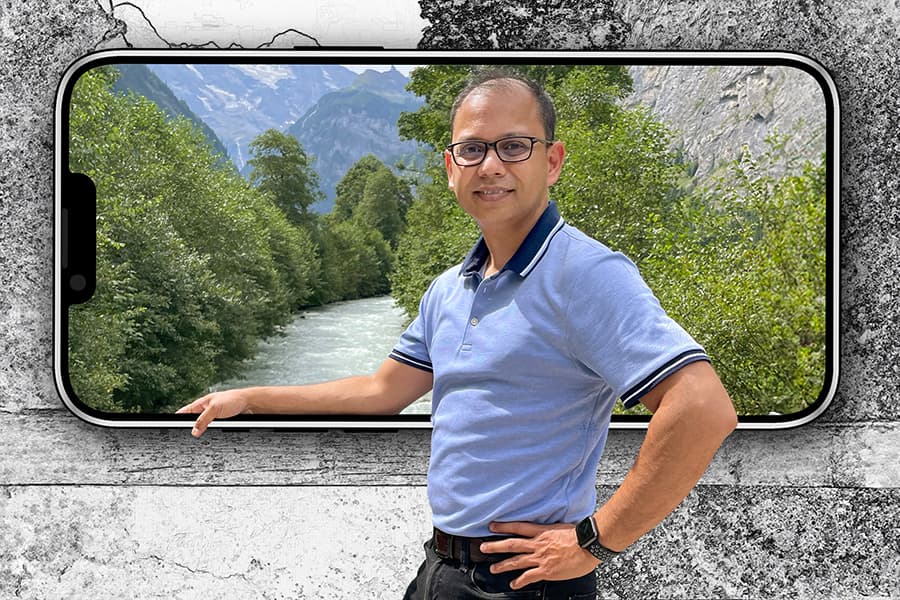
Advancing A-Eye
By Kelly Rembold
Vikas Chandra has his eyes on the future.
Vikas is senior director of AI at Meta Reality Labs, leading a research team that focuses on enabling AI features for Meta’s Mixed Reality headsets and Ray-Ban Meta glasses.
"The best thing about working at Meta is that I am literally able to see the future invented in front of my eyes,” says Vikas, a 2002 and 2004 Carnegie Mellon University College of Engineering graduate with a master’s and Ph.D. in Electrical and Computer Engineering. “We are working on foundational technologies that will alter the way we interact with our devices and the world.”
Vikas’ work at Meta aligns with his longtime research interests in efficient design — an engineering process where researchers architect and optimize products or systems to make them more efficient and cost-effective.
He has authored more than 150 research papers and has more than 40 granted/filed patents on the subject throughout his career while shifting his work and research to reflect the evolution in technology.
“During the early part of my career, my work was mostly on system architecture,” Vikas says. “Over the last 10 years, I have pivoted to more AI-centric work where we are building really smart on-device AI models that are more capable as well as efficient.”
Meta-morphosis
Before joining Meta, Vikas was the director of applied machine learning at Arm Research, where he led a team focused on enabling AI on tiny devices. The team heavily contributed to creation of a new field of machine learning called TinyML, which allows models to run on smaller, less powerful devices. Their work caught the attention of the machine learning industry — and Facebook.
In April 2018, Facebook approached Vikas about a new role in its Oculus Research Organization (later renamed to Reality Labs). After meeting with senior leaders and learning more about it, he accepted the job.
“I was just amazed to see the vision as well as the investments being made [in this technology],” he says.
Since then, Vikas has been a part of major milestones for the company, including its name change and the release of the Quest 2, Quest 3 and Ray-Ban Meta smart glasses.
For Vikas, those milestones are only the beginning.
“As we say in Meta, the journey is only 1% done,” Vikas says. “We have a long way to go, but it is very satisfying to work on technology that eventually billions of people across the globe will use.”
Cognitive and Contextual
At Meta, Vikas and his team are preparing for a future where all smart devices are wearable.
They are working to incorporate more contextual AI into smart glasses, enabling the wearer to interact with their device hands-free.
“Now your interaction model is not through tapping, pinching and swiping like what we do on phones right now,” Vikas says. “It becomes voice-based. It becomes context-based. Sometimes, you may not even need to tell it to do something, it proactively does it for you.”
This is made possible through different sensors and data capture devices, as well as enabling on-device computation.
“These devices can see what you see. They can hear what you hear, when you allow them to,” Vikas says. “It has a lot more context of who you are, where you are and what you're doing. Are you running? Are you sleeping? Are you in the car? How’s the weather around you? How does your calendar look? And all that context can come together and do useful things for you, basically reducing your cognitive overload.”
The team’s work also focuses on efficient on-device AI, which becomes super important for wearable devices. “It becomes even harder when it's glasses because it's sitting on the face,” he says. “It shouldn’t run out of battery. It shouldn’t become too hot.”
Focused on the Future
Vikas credits Carnegie Mellon for helping him get to where he is today.
“It was the overall environment at CMU that made me the person I am today,” he says. “It taught me to work hard, but also be maniacally focused toward the goal. I still lean on many of these soft skills that I picked up during my time at CMU to help and guide me when the going gets tough.”
When things do get difficult, Vikas reminds himself that his work is making a difference in the world.
“My inspiration to still work very hard comes from the fact that I want to leave the world in a better place,” he says. “Tectonic changes do not happen overnight. It’s the hard work of a lot of motivated people over decades that moves the needle. I am just trying to do my part as best as I can.”